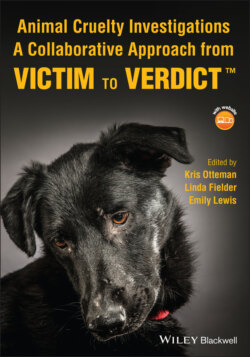Читать книгу Animal Cruelty Investigations - Группа авторов - Страница 181
6.6 Conflicts of Interest
ОглавлениеA conflict of interest may occur when there is a competing professional or personal interest making it difficult for an individual to follow through with their duties in an impartial manner. A conflict of interest becomes an issue if the appearance or evidence of bias arises and can be used to discredit a veterinarian in court. The most common scenario in which concern about a potential conflict of interest may surface is with the veterinarian–client or veterinarian–employee relationship.
In community practice, veterinarians are paid by clients to diagnose and treat their animals. In the event a veterinarian suspects a client of potential animal neglect or abuse, the doctor may question themselves as to whether objective and impartial opinions regarding the situation are possible. An individual's loyalty is to the truth and the law first. The oath sworn upon graduation to protect animal health and welfare also lights the path forward in circumstances that may seem unclear. Remember that in many states and countries reporting animal cruelty is required and affords financial and legal protection for the doctor involved. Many times, the veterinarian is the sole advocate for the animal that has suffered maltreatment and, much like the teacher or the doctor, in the case of children, is the professional with the knowledge and obligation to detect and report abuse. Act on your concerns and move forward with reporting and investigating appropriate suspicions whenever necessary. When the investigation is completed, if bias is a concern other veterinarians may be asked to review evidence in the case to ensure elimination of this concern. Avoid being offended by this situation, but rather view this as the appropriate safety net and second opinion that will lead to a fair and legal outcome in each case. This obligation goes both ways: you could be called upon to be the reviewer in some cases as well.
Situations in which a veterinarian must consider recusing themselves from involvement may include those in which the doctor has an ownership interest in the animal(s) being investigated or is the subject of the investigation. Employee–employer relationships may also have an impact on an investigation. If the employment relationship makes it difficult to ensure impartiality and thorough analysis of the situation, the veterinarian should not be involved in this type of case. This may occur when an employee of a veterinarian is a suspect or somehow involved in a cruelty investigation. Details with consideration for privacy requirements about these relationships, such as the employee's status (hired, fired, in good standing, and so on), must be provided to the investigator, who is often a good resource in identifying potential conflicts of interest.
A suspect in an animal cruelty case may very well be a current or past client of the veterinarian assisting in an investigation or reporting potential cruelty. Again, provide details about these relationships to the investigator. Client information about services provided and financial transactions are all relevant. This includes work previously completed and paid for or failure to pay for services. Any other issues that have arisen with the professional relationship must be fully disclosed. Previous records of providing services or a client's failure to pay do not necessarily conclude that a veterinarian cannot provide an expert opinion without bias. Exchange of money for veterinary services and failure to pay are all considered to be part of the routine business of veterinary medicine, and a credible veterinarian would be expected to hold financial dealings separate from their opinions on the animal's health and welfare. Always disclose this information to investigators to ensure full transparency.
The possibility of a conflict of interest is considered on a case‐by‐case basis and may occur even when nothing improper, illegal, or unethical has occurred. Assuming the veterinarian can maintain objectivity and fairness, the next question is will others believe the veterinarian's opinions to be true? Unless a clear conflict is uncovered by an investigator, the answer to this question is yes. Transparency to the investigating agency is crucial in all cases. Be certain to explain relationships, prior or current business dealings, or any other information that may be relevant to the investigation.
